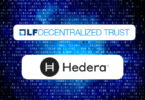On 31 August 2020, the Korea Internet Security Agency (KISA) announced plans to introduce a blockchain-based decentralized identity (DID app) for its employees. KISA is an arm of Korea’s Ministry of Science and ICT and aims to strengthen competition in Korea’s internet and information security industry.
The organization will first introduce the system to employees of its Naju headquarters in late October. After that, it will roll out to the Pangyo and Seoul offices within the year. KISA’s president Kim Seok-Hwan hopes that other local organizations will also use the system at some point.
The KISA solution will store the employee ID on the blockchain, so it can’t be forged or altered. Any personal information that is required for authentication purposes will be encrypted and kept on the employee’s smartphone. This allows the user to access their information easily, and ensures safer storage rather than the traditional plastic employee ID tags. Employees will be able to use this for access to the office as well as for additional services such as cafeteria or library use. For some applications, the DID can be combined with secondary authentication.
In the future, KISA hopes to expand the app’s scope, possibly providing employees with a type of reward system. In this, they’ll hand out ‘KISA coins’ (an interim name) and the identity can be used to pay for food, drinks, and office supplies.
Kim Seok-Hwan outlined the importance of identity during the current crisis, where we cannot meet others face-to-face. DID may be the optimal technology to achieve this.
This view is shared by Hyeon-Ki Jang, Head of R&D of Korea’s second-largest bank, Shinhan Bank. Last week Shinhan announced it’s also deploying a blockchain-based decentralized identity solution for online banking.
Korea has quickly made moves to become a leading country in the DID sector. Over the past year, over 30 Korean institutions took part in Korea’s Financial Telecommunications and Clearing Institute’s (KTFC) blockchain-based digital ID solution. In June, Korea’s three largest mobile operators, SK Telecom, KT, and LG U+ launched a mobile blockchain-based DID app called ‘Pass,’ basing the data off of driving licences. It allows users to prove their ages without revealing other personal data.
Another major association in the Korean DID industry is the DID Alliance, which has plans to take charge of self-sovereign identity in Korea with a global impact. With plenty of other initiatives along the way, Korea is strengthening its leadership position in DID services.






